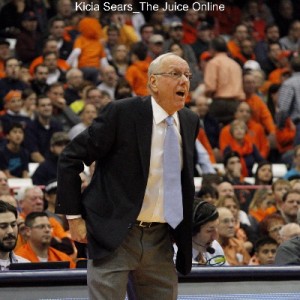

Item: There’s an interesting breakdown of numbers among all-time winning Power 5 football and basketball programs in a recent Wall Street Journal article. It details that with a historical winning percentage of .693 (prior to Sunday’s win over Texas Southern) ranking fifth best among Div. I basketball programs, along with a football all-time winning percentage of .574 (no doubt weighed down by the Orange’s 84-145 mark since Donovan McNabb’s last game in the 1999 Orange Bowl), the subsequent total winning percentage disparity of .119 between the two sports lands Syracuse among the top ten schools that can truly call itself a ‘basketball school.’
It didn’t used to be this way. Once Ben Schwartzwalder was hired from tiny Muhlenberg College in 1949 to resurrect Syracuse football that had won only 11 games since the 1943 season was suspended due to World War II, at a time when the college version of the sport captured the preeminent national coverage as opposed to its professional counterpart, SU football took off. Coach Ben subsequently guided the Orangemen to seven bowls over his 25 seasons, a period when there was only a handful of postseason games to compete for an invitation, with the 1959 national championship cementing the school’s place as one of the Eastern region’s top programs, and the name “Syracuse” tied to collegiate gridiron success.
At the same time, the late 1950s and early 60s was not a period to reminisce fondly about SU basketball, including a frightful 27 game losing streak crossing over between the 1961 and ’62 seasons, for a program that was about to embark on a new era of playing games at Manley Field House, and welcoming freshmen recruits Dave Bing and Jim Boeheim in 1962 who would help lead the program to 17 victories in 1964, and a 22 win season that came within one victory of the Final Four in ’66.
» Related: 2015-16 Syracuse basketball: Midseason Report Card
Now approaching 55 of his 71 years on earth connected to the university in some way, shape, or form, Boeheim knows as well as anybody the transition that has taken place from the glory of a football national championship and boasting a Heisman Trophy winner, while annually playing one of the top intersectional schedules in the country, hosting many big name programs at Archbold Stadium, to Schwartzwalder’s inability to keep up with the times during the fast-changing 1970s, the crumbling stadium’s rapid demise, and finally his retirement after the 1973 season, ending a Hall of Fame career and coinciding with the rise of Orange hoops.
A transformation was taking place with the emergence of a rabid sect of Orangmen fans nicknamed the Manley Zoo, and an out-of-nowhere Final Four appearance in 1975 that marked Syracuse’s early stages of making the step up from a regional to national program in stature, followed by the transition of playing hoops at Manley to the eventual numerous record crowds and virtually annual Dome attendance crowns all under Boeheim’s direction since 1976 in forging his own Hall of Fame career.
“I told him Syracuse used to be a football school,” Boeheim said back in 2005 when speaking about first being introduced to California native and outlier Greg Robinson, before Robinson’s disastrous four year run from ’05-’08 ended with only 10 wins.
It was typical Boeheim at the time, humbling deflecting the credit for singlehandedly building ‘Cuse basketball into a national “name” program and now as the numbers from the WSJ indicate, his legacy has indelibly made Syracuse a ‘basketball school.’
For more Syracuse coverage, Like our Facebook page and follow us @TheJuiceOnline.

